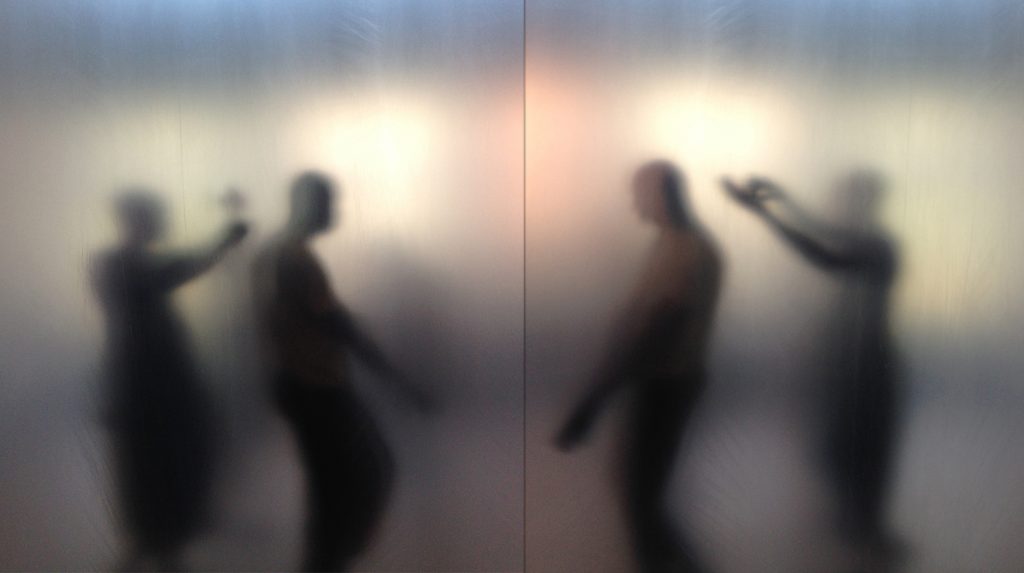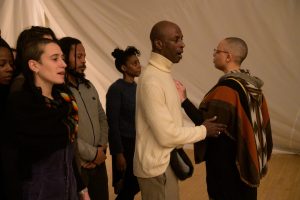Sitting On a Man’s Head, Okwui Okpokwasili and Peter Born
April 14, 2020
This excerpted text, written by Okwui Okpokwasili and Peter Born, was first published, in full, in the Platform 2020 Catalogue, Utterances From The Chorus, Vol. I. It describes the surrounding research and questions of Okwui Okwpokwasili and Peter Born’s durational practice and installation, Sitting On A Man’s Head. Curated by Okwui and Judy Hussie-Taylor as a centerpiece to the Platform, Sitting on A Man’s Head was meant to be activated once a week, by 30 performer activators, for four hours every Friday night. It served as a feedback loop, a place of return, a chorus, and a refrain. Before the Platform’s premature end to live performances as a response to city restrictions on gatherings, due to the Covid-19 Pandemic, Sitting On A Man’s head was shared with audiences twice privately for groups of invited guests and students and twice publicly, once on February 28 and again on March 6th, leaving the last two public dates, March 13th and March 20th cancelled, along with the other remaining Platform events.
Sitting On a Man’s Head
Okwui Okpokwasili and Peter Born
(New York Premiere)
Friday, February 28, 6-10pm
Friday, March 6, 6-10pm
Friday, March 13, 6-10pm – CANCELLED
Friday, March 20, 6-10pm – CANCELLED
The political institutions of Southeastern Nigerian women were all but invisible to the British Imperial government, so in 1929 when women mobilized in protest against the colonial government, the British were caught by surprise when faced with two months of extended protests. They referred to this mobilization of women as riots, while the people of the region described the events as a war, the Women’s War of 1929.
“Sitting on a Man”[1] was a disruptive durational practice and a very public act of shaming carried out by a collective of women. It involved gathering in the private courtyard of a colonial official, dancing and singing songs designed to embarrass the official until he promised to address their concerns. This practice was used by women as a critical tool to protect their economic and social interests.
The Woman’s War was also known as the Woman’s Egwu. In the Igbo language, egwu means dance. This linguistic link in the Igbo language between protest and performance underscores the performativity essential to embodied protest. A performer directs the gaze of the viewer and shapes the subjective voice. Performance is concerned with the practice of becoming visible. Embodied protest is the act of becoming visible and speaking in defiance of the silence that an oppressive system demands. The performer and the protestor write their own text, they speak that text and become visible. They begin to shape the ways in which they are visible and demand new ways of seeing, new ways of forming relations. Both performance and protest are rendering tools in the urgent enactment of making pain visible and voicing resistance against ongoing violations while imagining new possibilities for spaces of restoration and restitution.
In Sitting On a Man’s Head the space of restoration and restitution is our concern. Where the women in Nigeria had long-standing kinship and communal bonds, a shared language and shared concerns, we consider making a space for the formation of new bonds of kinship around some common questions.
We hope to use the tools of our performance practice to build a space for the creation of an improvisational public song, composed of aural and choreographic gestures. Can a shared creative practice be generative and generous while also being instructive in imagining new possibilities of communal relations?
The work featured a rotating chorus of performers, who activated the practice: Martita Abril, Peter Born, Jennifer Brogle, mayfield brooks, Leslie Cuyjet, André Daughtry, Eisa Davis, Brittany Engel-Adams, Lily Gold, Naja Gordon, Melanie Greene, Audrey Hailes, Remi Harris, Jasmine Hearn, Justin Hicks, Shayla-Vie Jenkins, Chaesong Kim, Tendayi Kuumba, Breyanna Maples, Priscilla Marrero, Anais Maviel, Okwui Okpokwasili, Maya Orchin, Kay Ottinger, jess pretty, Greg Purnell, Hans Rasch, Katrina Reid, Jean Carla Rodea, Lily Bo Shapiro, Samita Sinha, Eleanor Smith, Tatyana Tenenbaum, David Thomson, Pyeng Threadgill, Asiya Wadud, Charmaine Warren, AJ Wilmore, Anna Witenberg, and Nehemoyia Young.

